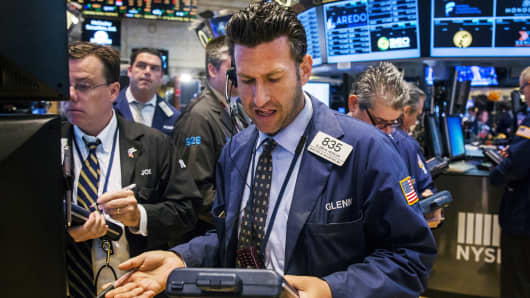Investors should always be looking for what will be instead of what has been, so the investing playbook for the next few years should look far different from what has been seen over the past few years. The bull market in stocks off the lows of '09 had tailwinds of a cyclical economic recovery, a strong earnings rebound, record high profit margins, multiple rounds of quantitative easing and zero interest rates that drove an extraordinary level of stock buyback activity that was only last seen in 2006 and 2007.
The result of the bull run however has brought market valuations to levels only seen in the year 2000 according to a variety of metrics. As valuations only matter when they do and expensive can always get more expensive (as evidenced by the late 1990's bull market,) we must ask the question: have we reached a point where valuations suddenly matter for stocks in terms of future market behavior? My answer is an emphatic yes.
The tailwinds listed above I believe are all now headwinds and that is the likely trigger for a rethink on excessive valuations which I believe will result in lower stock prices or at best, very modest returns in coming years. The global economic rebound is running out of gas. Estimates for world gross domestic product have fallen to 3 percent which would be the weakest since the recovery began in 2009. China, the second largest economy in the world, has growth slowing to the weakest in decades. In the U.S., 2 percent to 2.5 percent growth per annum seen since the recovery is at risk of falling below 2 percent by year end as excessive inventories, weak exports, a near recession in manufacturing, mediocre consumer spending, and soft capital expenditures weigh on growth.
Earnings for the S&P 500 are on track to fall on a year over year basis for the second straight quarter, thus putting us in an earnings 'recession.' Yes, a sharp drop in energy earnings is the main catalyst but I don't believe in taking out that sector to make one feel better as firstly, no one took it out when oil was at $100 and secondly if we do ex out energy earnings, we must also take out airline earnings that were boosted by lower energy prices, restaurant and bar sales that benefited from the savings at the gas pump and earnings increases from industrial companies that saw lower raw material costs. With respect to revenue growth, they've now contracted for three straight quarters on a year over year basis.
Corporate profit margins have started to roll over and are a key factor described in the previous paragraph. Three catalysts for higher margins in this recovery are no longer. Lowered interest expense was a main catalyst for driving higher earnings and margins in response to the dramatic fall in interest rates. That lever can no longer be pulled as the Federal Reserve is about to hike rates and the cost of capital for both investment grade and high yield companies head higher. Labor costs as a percent of corporate profits reached the lowest level since World War II post crisis and that trend is now beginning to reverse as the labor market tightens, skilled workers gain more leverage and low skilled employees get minimum wage hikes. The third factor is it will get more expensive to borrow money for aggressive stock buybacks due to the higher cost of capital just mentioned at the same time that corporate cash flow growth is slowing. Thus, the amazing kicker to earnings per share that stock buybacks brought will begin to moderate.
Lastly and likely most importantly, we're about to begin the second phase of Fed tightening. It started in October 2014 when QE 3 ended and is it any coincidence that the stock market is basically flat since? No. In December we will most likely begin the second step of Fed tightening. For the past few years, Fed QE and ZIRP covered up a lot of warts in this market (excessive valuations, modest economic activity and low quality earnings growth) that were easily dismissed, but that has begun to change as the Fed slowly continues its step away from its unprecedented behavior.
Bottom line, as circumstances change, so should you. I believe chinks in the bullish armor are becoming more pronounced and in the context of the third longest bull market of all time, investors should now be watching their backs and playing some defense.
That would mean raising cash, culling the portfolio of overvalued stocks and even buying what has already been beaten up in their own multiyear bear market, including commodity related equities such as gold miners and agriculture related stocks.
Commentary by Peter Boockvar, the chief market analyst for The Lindsey Group and the co-chief investment officer for Bookmark Advisors.





